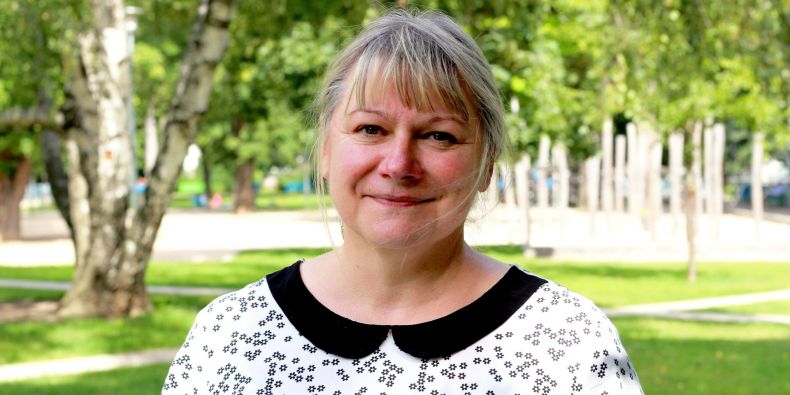Czech grammar and conversation lessons in the morning, specialised lectures in the afternoon, a Czech film club in the evening and trips around the Czech Republic over the weekend. This was the programme of the four-week Summer School of Slavonic Studies organised by the Department of Czech for Foreigners at the Faculty of Arts, Masaryk University. People from all over the world came to study Czech in this programme.
Milena Söderber from Sweden differed from most of the other participants in that she was not on holidays from school or work. Even as she was doing her homework and writing essays in the evenings, she was still doing her job in the Swedish army, where she has served for thirty-two years. She became more interested in the language when it became necessary to find someone to train Czech pilots and mechanics in flying and maintaining Gripen fighters.
Czech can be a tongue twister
Even though her first language is Swedish, she heard Czech ever since she was a little girl. “My mum married into Sweden, but she comes from Prague. She always thought she might go back home one day, so she read Czech children’s books to me – stories by Josef Lada, the Little Mole, or The Grandmother by Božena Němcová. While we spoke Swedish at home, Czech was also occasionally used. This means I don’t struggle with pronunciation as much as other foreigners, as I learned the most difficult sounds such as ‘ř’ when I was a child,” says Söderber.
She started really working on her Czech when word got around in the Swedish army that Gripen fighters would be sold to the Czech Republic. Söderber offered to help Saab, the company producing the fighters, with communication in the Czech Republic.
As she describes it, “They were very happy to take me up on my offer, but my Czech wasn’t that great, so I had to start learning. I started to speak mostly in Czech with my mum, I registered for an online course of Czech and I read a lot.”
And fifteen years ago, she visited Brno for the first time with Saab during a trade fair of weapons and military equipment. “I almost twisted my tongue. Swedish doesn’t have as many consonants in a row as there are, for example, in the Czech word čtvrť,” she laughs, as she remembers her first try at communicating in Czech. Other than some slight issues at customs, however, her visit to the Czech Republic went well.

The Swedish company went on to win the contract and the first Czech pilots and mechanics completed a year of training at the Swedish military school where Söderber works. “I welcomed them in Czech and I even managed a presentation about our school in Czech,” she says. “But the lessons were in English, that’s actually required by law.”
Milena Söderber has been teaching at the Försvarsmaktens Tekniska Skol in Halmstad in the south of Sweden for twelve years. “I recently asked to change jobs, but I’ll only be moving one building over. I would like to teach optronics. Optical and optoelectronic systems can be found in weapons and radar as well as in cameras. I will now spend at a year studying to be able to teach others. The technology keeps developing and improving,” she says.
Moreover, this is the third summer that Söderber is spending in Brno. She began to like Czech so much that she decided to continue her studies. She applied for a Swedish army grant for foreign language study and four years ago, she went to Brno for her first Summer School of Slavonic Studies.
Back then, she was in the pre-intermediate group, while now she is intermediate. She says that students in the higher levels know Czech grammar better than Czechs do, and she laughs as she adds: “And most importantly, they actually speak standard Czech.”
“For me, the endings are the biggest challenge, that’s where I keep making mistakes, and also where to write ‘i’ and where ‘y’. Lately, I’ve been noticing that Czech sentences are awfully long. It’s easy to get lost in them, especially if the subject is only implied.” But she says in praise of Czech, “On the other hand, the easiest part is that you usually read Czech the way you write it. In Swedish, you have to know the word to be able to spell it correctly.”
Motorcycling beyond the polar circle
She tries to keep in touch with Czech during the rest of year as well. In Sweden, she reads Czech books, listens to online radio, watches Czech TV series and is currently considering getting satellite TV.
“However, I don’t have as much time for all this as I would like to. I’m at work all the time and on weekends I mostly travel around Sweden on a motorbike. At least once a year, during the polar day, I ride all the way to Kiruna in the north. The distance from my home to the north of Sweden is the same as to Rome,” she laughs.
She also enjoys diving and was thrilled with her visits to the Great Barrier Reef in Australia and to Guadalupe Island. She has also been several times to the US and travelled to Thailand, Israel, Egypt, and New Zealand. Last year, she missed one year of the summer school due to a trip around the world which took her four and a half months.
“There is nothing like the Summer School of Slavonic Studies in Sweden, and I think that’s rather surprising,” says Söderber. “It’s a great experience for young people – it’s not only that they can learn something new and visit a new place, but most importantly they learn to be tolerant. They get to know people from other countries with different customs and cultures, which can only be good for international relationships. If every country did the same thing, Europe would be quite a different place today.”
